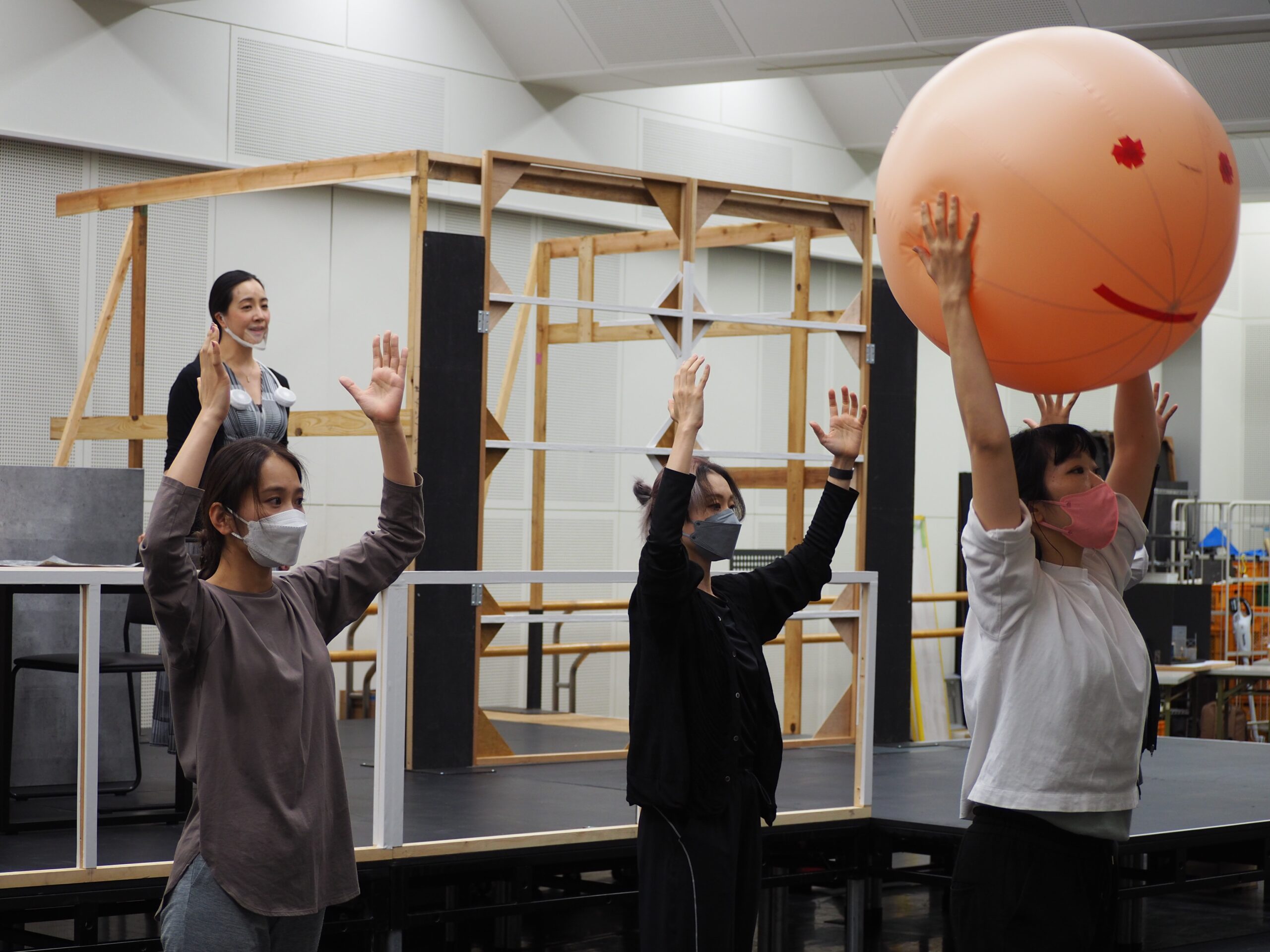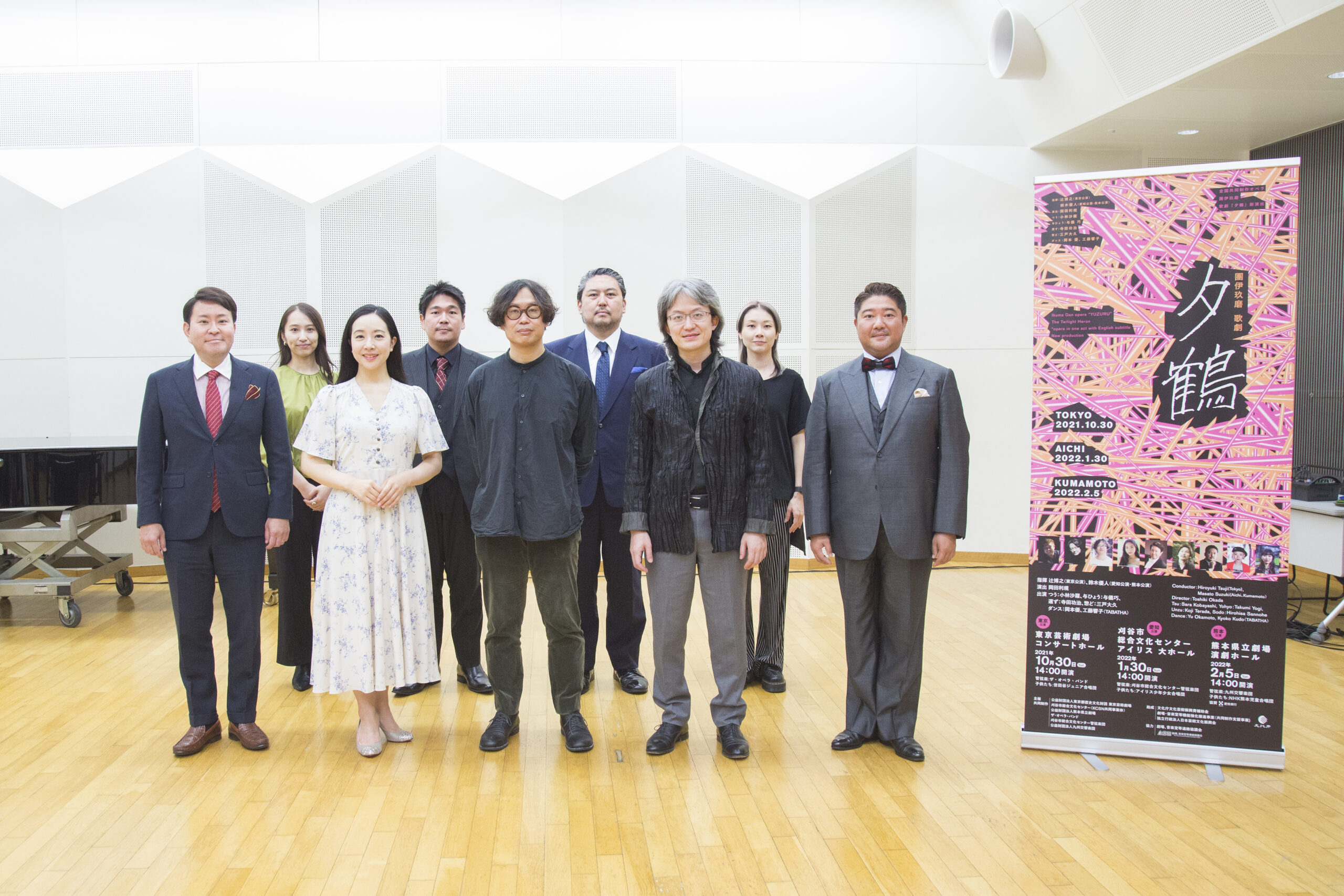
The ground-breaking dramatist Toshiki Okada’s drive for artistic adventure has earned him many of Japan’s top theater awards.
So, as he recently finished a four-year stint as director of repertoires at the prestigious Munich Kammerspiele in Germany, the 48-year-old founder of Tokyo’s globe-trotting Chelfitsch company was eager to seek out yet more new horizons.
First off, in June this year, he presented his self-penned contemporary Noh play “Unfulfilled Ghost and the Monster Zaha/Tsuruga,” questioning both Japan’s nuclear power policy and today’s mega-business Olympic games.
Now, for his first-ever foray into the rarefied realm of opera, he’s tackling Ikuma Dan’s one-act “Yūzuru” (“Twilight Crane”), a home-grown classic performed here almost 1,000 times since its premiere in 1952.
Based on a 1948 work of the same name by the leading postwar modern drama playwright Junji Kinoshita, the opera similarly draws on a popular folklore tale about a poor farmer named Yohyō (Takumi Yogi) who saves an injured crane that transforms into a beautiful woman named Tsū (Sara Kobayashi) who becomes his wife.
To show her gratitude for his help, Tsū weaves beautiful fabric using her feathers to make some money for the family — but asks her husband to promise he will never watch her at work.
Although Yohyō — incited by his greedy friends Sōdo (Hirohisa Sannohe) and Unzu (Koji Terada) — keeps urging her to weave more and more for them to sell, Tsū wonders why he can’t be content with their simple loving life together.
That’s until Yohyō peeps into her room, where he sees a weak and ailing crane busily weaving. But when his wife discovers he’s broken his promise, she sheds her human form and flies away into the night sky.
Then, of course, Yohyō realizes he’s lost a priceless love that no money could buy.
However, at a September press conference Okada seemed anything but overawed by this iconic one-act production, saying, “I’ve never had much to do with opera before. But as I got this great opportunity I wanted to find out what the director’s task is in it.”
Yet speaking after about a week of workshops and rehearsals with the conductors and singers, he felt able to say, “I have discovered the point of my role.
“Before this project, I understood music as a rather abstract art form far removed from stories and meanings, but I now newly realize that opera music expresses the story and also the characters’ feelings in every way. Hence opera directors don’t need to be involved in such things as making the characters during the rehearsals. So I am going about this in a different way from my usual theater director’s approach.”
For the cast, too, this production appears to present a quite different approach from normal.
In a recent interview, the soprano singer Sara Kobayashi (Tsū) says how she was really surprised that Okada spent such a long time in discussions about the content — saying that is “very rare in conventional opera rehearsals.”
At the press conference, the tenor Takumi Yogi (Yohyō’) also said, “We are having discussions about everything together. Okada decides each movement based on our communal understanding after listening to everyone’s opinions. Even if a scene doesn’t relate to me, he asks for my opinion and inevitably that makes me become more interested in the other characters.
“I was never like that before. It’s entirely new for me and I am so excited about this new method.”
So Okada’s democratic way of working is obviously different, but to what end? Well, at the press conference the two conductors, four singers and two dancers present said in unrehearsed unison words to the effect that this “Yūzuru” will be a very contemporary and different staging from past productions.
As Kobayashi put it, “I first saw the play ‘Yūzuru’ when I was a junior high school student and Tsū became one of my dream roles. Since then I’ve seen many versions by different directors, but now I’m thinking I need to reset my image of this heroine and start to create an entirely new Tsū from scratch.
“So the challenge is how to present Okada’s new concept of ‘Yūzuru’ to the audiences. That’s what I’m wrestling with.”
As for the director himself, Okada firmly stated that instead of the aesthetically tragic female love story normally presented, he envisions “a vivid production that viscerally connects with today’s audiences whose lives have been captured by capitalism.”
So rather than portraying Yohyō and his two friends losing their heads for money as an old allegory about simple peasants, his “Yūzuru” mirrors how irreplaceable assets are mindlessly being wasted for short-term gain in the modern world.
To further translate his opera from the general to the personal for each audience member, Okada says, “I have changed Tsū’s character from being folklore’s image of a pure and innocent victim to that of an individual rejecting the temptations of capitalism and asking whether our values based on it are really right or not.”
“Yūzuru” plays once only, on Oct. 30, at Tokyo Metropolitan Theatre in Toshima Ward. It then plays at Kariya City Hall in Aichi Prefecture on Jan. 30, 2022, and Kumamoto Prefectural Theater on Feb. 5. For more details, visit www.opera-yuzuru.com or www.geigeki.jp.

